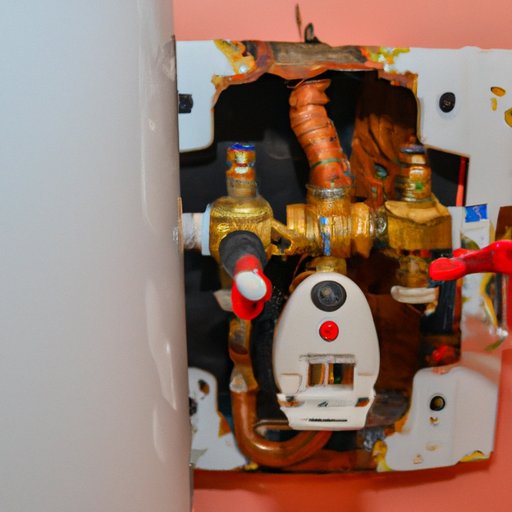Introduction
A hot water heater breaker is a protective device that is designed to keep your home’s electrical system safe. When a hot water heater breaker trips, it cuts off power to the appliance, preventing it from overloading your home’s electrical circuit. In this article, you will explore why a hot water heater breaker trips and the steps you can take to prevent the problem from occurring in the future.
Exploring Common Causes of Tripped Hot Water Heater Breakers
When your hot water heater breaker trips, it usually indicates that there is an issue with your home’s electrical system. Common causes of a tripped hot water heater breaker include:
Overloading the Circuit
If too many appliances are connected to the same circuit, it can cause the circuit to become overloaded. This can cause the hot water heater breaker to trip and cut off power to the appliance.
Short Circuits
A short circuit occurs when two wires within the circuit touch each other, creating an unintended path for electricity. This can cause the hot water heater breaker to trip and shut off power to the appliance.
Ground Faults
A ground fault occurs when electricity flows outside of the intended path. This can be caused by damaged wiring or loose connections. If a ground fault occurs, the hot water heater breaker will trip to protect the appliance.
Corrosion
Corrosion on the wires or connections can cause a hot water heater breaker to trip. Corrosion can happen over time due to exposure to moisture or chemicals.
Loose Connections
Loose connections between the wires and the circuit breaker can cause a hot water heater breaker to trip. This can be caused by improper installation or damage to the wires.
Too Much Voltage
If the voltage supplied to the hot water heater is too high, it can cause the breaker to trip. This can be caused by a malfunctioning power supply or an outdated electrical system.

The Benefits of Knowing Why a Hot Water Heater Breaker Trips
Knowing why your hot water heater breaker trips can save you time and money. It can also help you avoid potential safety hazards. If you know the cause of the problem, you can take steps to fix it before it causes more damage.

How to Diagnose and Resolve Problems with Hot Water Heater Breakers
If your hot water heater breaker trips, you should first check the breaker box to make sure all the connections are secure. You should also test for voltage to make sure the correct amount of power is being supplied to the appliance. Once you have determined the cause of the problem, you can take steps to resolve it. This may include tightening connections or cleaning corrosion from the wires.
Troubleshooting Tips for When Your Hot Water Heater Breaker Trips
When your hot water heater breaker trips, you should first turn off all appliances connected to the circuit. This will help you determine which appliance is causing the problem. You should then reset the breaker and see if it stays on. If it does not, you should call a professional electrician to inspect the circuit and repair any issues.

Understanding the Safety Features of Hot Water Heater Breakers
Most modern hot water heaters are equipped with safety features such as ground fault circuit interrupters (GFCIs) and arc fault circuit interrupters (AFCIs). These safety devices are designed to detect faults in the electrical system and trip the breaker if necessary. This helps protect your home from electrical fires and other hazards.
Conclusion
Hot water heater breakers are essential components of your home’s electrical system. By understanding why a hot water heater breaker trips and taking steps to diagnose and resolve the problem, you can help ensure the safety of your home and avoid costly repairs. Always remember to take safety precautions when dealing with electrical systems and call a professional if you are unsure of what to do.
(Note: Is this article not meeting your expectations? Do you have knowledge or insights to share? Unlock new opportunities and expand your reach by joining our authors team. Click Registration to join us and share your expertise with our readers.)
